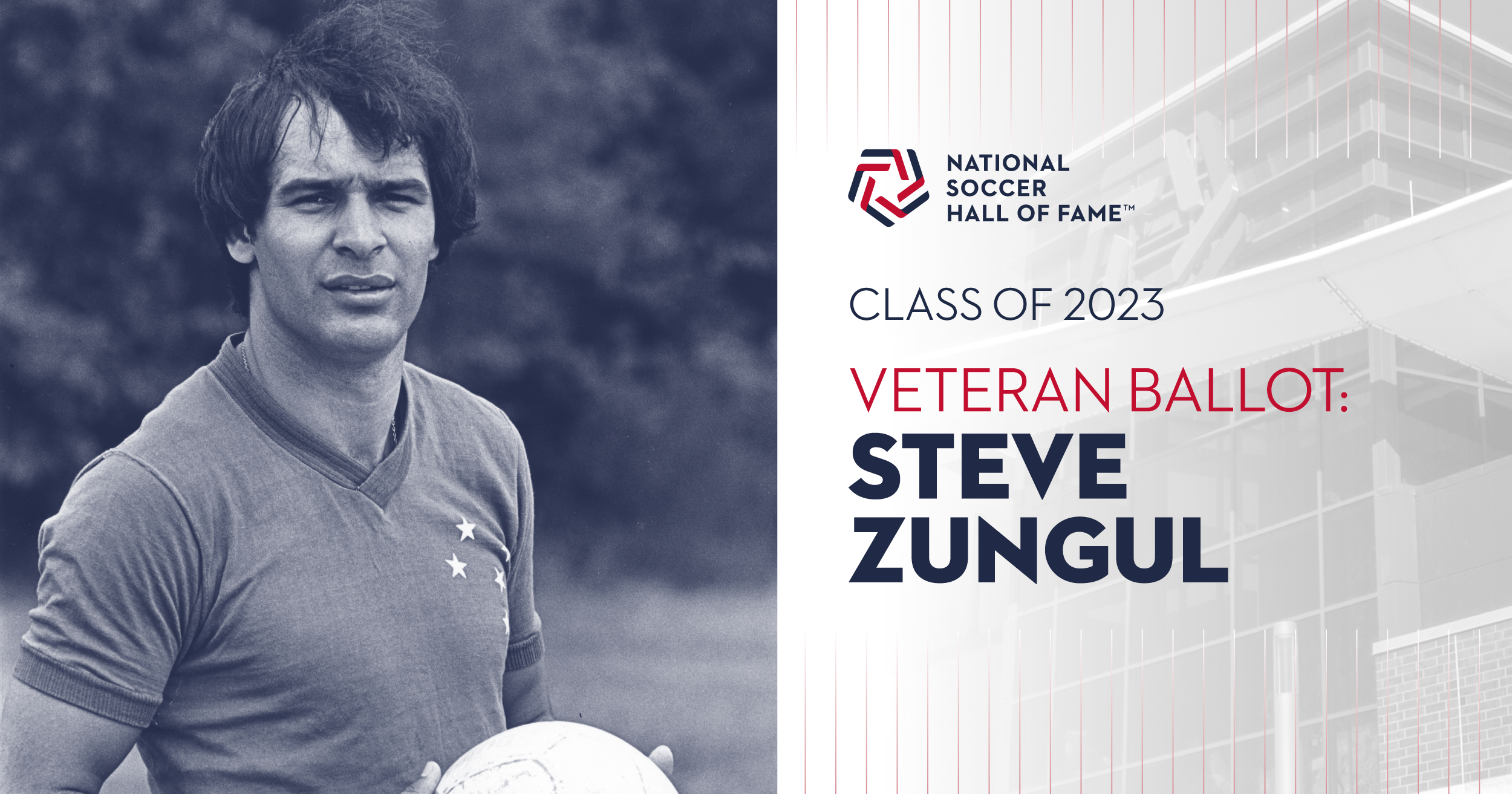Lord of All Indoors: Zungul Had a Gift for Scoring Goals

The New York Arrows were struggling in their indoor game against the archrival Baltimore Blast on April 2, 1982.
They were on the short end of a 5-2 score with 4:54 remaining in the third quarter before Steve Zungul turned the Major Indoor Soccer League contest on its head.
Zungul scorched the net three times during an astounding 37-second span, reminding any doubters why he deserved his nickname: The Lord of All Indoors.
He raced into the penalty box and drilled the ball past goalkeeper Sepp Gantenhammer and into the net at 10:06. Only 18 seconds later, Juan Carlos Michia intercepted a pass and fed Zungul, who scored yet again. Michia again turned an interception into a Zungul breakaway. He faked right and the keeper went left, and the game was tied at 10:43.
Minutes later, Zungul set up the go-ahead score, finishing with five goals in an 8-6 win. He broke the previous record of three goals within 66 seconds — a record set by Zungul himself.
“He was amazing,” Arrows coach Don Popovic said after the game. “We regained our confidence. The goals demoralized them badly.”
Zungul did that to many teams over his virtuoso 12-year career. He also set many indoor soccer records, many of which still stand.
“He was the greatest indoor player to ever play here,” former teammate and goalkeeper Shep Messing told The Guardian in 2016.
On May 6, Zungul will receive another high honor as he will be inducted into the National Soccer Hall of Fame in Frisco, Texas.

Popovic, who was a tough coach to please, marveled at Zungul’s ability to score at a blistering pace — and to entertain.
“Zungul has had games where the opposition has stopped him,” Popovic said in 1982. “Zungul doesn’t have a bad game. Zungul has established a standard in this country that every club should follow. Watching Zungul play indoors, no matter what sport you’re in, you have to enjoy him. I’d say he’s the best player ever, in this country. One-on-one, he’s unbelievable.
“His speed is incredible, and so is his ability to score a goal, like Giorgio Chinaglia of the Cosmos. Every year Zungul comes back to break his own record.”
No hyperbole there. Zungul’s résumé is so astounding, it almost seems fictional.
He was a seven-time MISL champion, four times with the Arrows, three with the San Diego Sockers. He led the league in scoring on six occasions. He collected a record 108 goals (Joe Fink of the Philadelphia Fever was next with 51) and 44 assists for 152 points in the 1980-81 campaign, topping his point total the next season (163 off 103 goals and 60 assists). He also had a 76-game point scoring streak from 1978-81.
By the time he retired after the 1989-90 season, Zungul had scored 715 goals and assisted on 527 others for 1,242 points over 455 games.
“Steve was scoring with every part of his body,” said Canadian Soccer Hall of Famer and former Canadian international Branko Segota, who played with Zungul on three teams. “He was always in position. He loved to score. It didn’t matter. He would dive in there just to score the goal.”
Zungul was inducted into the Indoor Soccer Hall of Fame in 2011.
“You talk about Tatu [of the Dallas Sidekicks], but nobody was as good as Steve. He partied, he played hard, and he scored goals – and he was actually underrated in terms of his ability to be a playmaker,” Messing said. “He was good in the air and lightning quick with his first step, can hit a ball with the inside out of that left foot, outside of the left foot, inside of the right, outside of the right, control it in a tight space. He was a champ.”
The headline of a Sports Illustrated story by JD Reed on Feb. 2, 1981, proclaimed Zungul “Lord of All Indoors.” His fans had called him the Scoring Machine, a rather mundane nickname for someone in the midst of a legendary career.
Zungul demanded as much of his teammates as he did of himself, even in training.
“Alone in the scoring zone, trying to make himself invisible, Zungul seems comfortable being at arm’s length from everyone else,” Reed wrote about an Arrows scrimmage. “When the feed comes to him, he’s ready and explosive. If the ball arrives too late or too early or goes to another player who fails to score, Zungul writes volumes with his hands, accusing teammates, showing where the ball should have gone, indicating what would have happened if it had been on target — all with a deadpan expression Chaplin would have admired.”

Born as Slavisa Zungul in Pozarevac, Yugoslavia (now Serbia), on July 28, 1954, the future scoring star grew up in a working-class family home in Split (now Croatia). He had other interests besides the beautiful game.
“I liked painting and could have had a scholarship,” Zungul told Newsday in 1982. “I liked to fish and sail.”
Soccer, however, was his destiny, as he signed with Hajduk Split at age 17.
“My mother gave me a lot of freedom,” Zungul said. “I was never punished for things like missing school, but I did get into too many fights. I was always running around, never sitting still.”
That running paid off as Zungul recorded 82 goals in 177 matches for Split from 1971-78, winning the league twice, the Yugoslav Cup four times and helping the team reach the European Cup (now UEFA Champions League). Nicknamed “The Eel,” Zungul represented Yugoslavia 14 times.
North American Soccer League teams showed interest, but Zungul, then 24, could not leave the country because he hadn’t served time in the Yugoslavian army, as was mandated for men up to age 28.
During the 1978 winter break, Zungul was given permission to accompany his singer girlfriend Moni Kovacic to New York. He said that he would play in some indoor exhibition matches to keep in shape, but Zungul never returned. He joined the Arrows, scoring four goals in their 7-2 victory over the Cincinnati Kids in the MISL inaugural match on Dec. 22, 1978.
FIFA banned him from competing in all affiliated competitions; the MISL had no affiliation with FIFA.
Like many goal-scorers, Zungul had a healthy ego. But he backed up his statements with his accomplishments.
“I don’t have to prove myself,” he said in 1982. “I’ve proved myself for four years. The only thing left is to play more so we can be one of the regular sports on television — like baseball and football, so young kids can follow us. Soccer is this country is still not in a strong position.”
When asked how he would stop himself, Zungul replied:
“If I was a defender, I probably wouldn’t know how to stop me. I’m unpredictable. That makes me interesting.”
Zungul’s competitive fire burned brightly, on and off the field.
After the Arrows secured their first title in 1979, Messing, the first player to sign with the MISL, was named MVP of the championship series. Zungul scored a record seven goals in the opening game of the best-of-three series, a 14-7 victory over the Philadelphia Fever, and added three goals in the 9-5 clinching road win. Messing, who made 26 saves said he wanted to share the award with Zungul.
“The Steve Zungul I know: the best and the worst,” Messing told The Guardian. “What made him so great the first season, he was lightning out of a bottle, just electric, scoring goals. We were both alpha males. It was my team, and I jumped leagues and I was the main player and Zungul came in. I loved him. We became great friends.
“I was given a huge trophy. On the bus as we left the arena, Zungul starts screaming at me that he’s the MVP,” Messing said with a laugh. “We ended up fighting on the bus and having drinks together when we got back to New York. He had that volatile lightning temperament, personality and ego of all great goal-scorers.”
While Zungul was best known as a lethal indoor scorer, he demonstrated he still had the touch outdoors as well. After FIFA permitted him to play, Zungul tallied 36 goals and 25 assists in 46 regular-season appearances with the Golden Bay Earthquakes in the 1983 and 1984 NASL seasons, earning all-star honors. He was named the 1984 MVP, leading the league with 20 goals (and 10 assists) in 24 appearances. When the NASL went under, Zungul returned to indoors, playing with the Tacoma Stars and San Diego again before retiring in 1990.
Now 68, Zungul has lived a life out of the spotlight in southern California. But on May 6, he will find himself in the public eye once again, as the Lord of All Indoors will be honored for his legendary career.
